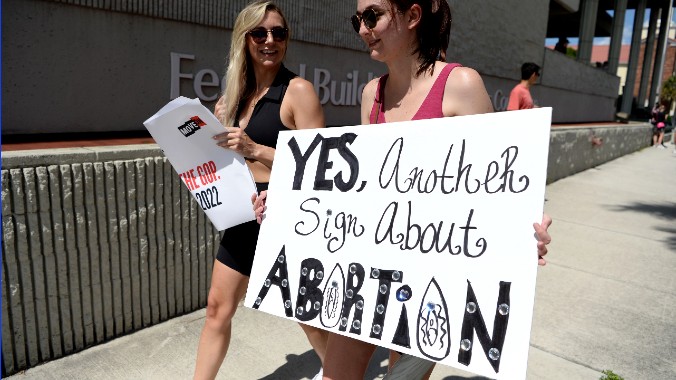Florida Supreme Court Obliterates Abortion Access in the South—But There’s 1 Small Silver Lining
The Court will allow Florida's brutal six-week abortion ban to take effect, but it will also allow a ballot measure to enshrine a constitutional right to abortion to move forward.
Photo: Shutterstock AbortionPolitics
After months of deliberation, the Florida Supreme Court on Monday ruled that the state’s 15-week abortion ban is constitutional—allowing a six-week abortion ban (which has been pending since Gov. Ron DeSantis (R) signed it last year) to take effect in 30 days. But the state Supreme Court, which consists largely of DeSantis appointees, also approved a proposed ballot measure for November that will allow voters to determine whether they want to establish a constitutional right to abortion.
For the rest of April, abortion will remain legal through 15 weeks in Florida. But when the six-week ban takes effect in May, abortion access will be obliterated across the South. Since the Supreme Court overturned Roe v. Wade in 2022, a rash of abortion bans swept the region, including all of Florida’s neighboring states (Alabama, Georgia, and South Carolina). North Carolina is the closest state where abortion is available until 12 weeks. Florida’s six-week ban—which, again, is effectively a total abortion ban because many people don’t know they’re pregnant or can’t access abortion within six weeks—is catastrophic for pregnant people in Florida and across the South, as an estimated 7,000 people traveled to the state for abortion last year.
But abortion rights groups are simultaneously celebrating the court’s decision to allow a ballot measure to move forward. This comes after the state attorney general sued in October to prevent the measure from making it onto ballots despite how advocates collected all the necessary signatures. At the time, she baselessly claimed the language is ambiguous around whether the measure would allow abortions past “fetal viability.” In reality, the proposed amendment states: “No law shall prohibit, penalize, delay, or restrict abortion before viability or when necessary to protect the patient’s health, as determined by the patient’s healthcare provider.” This is about as clear as it gets.
-

-

-

-

-

-

-

-

-

-

-

-

-

-

-

-

-

-

-

-

-

-

-

-

-

-

-

-

-

-

-

-

-

-

-

-

-

-

-

-








































